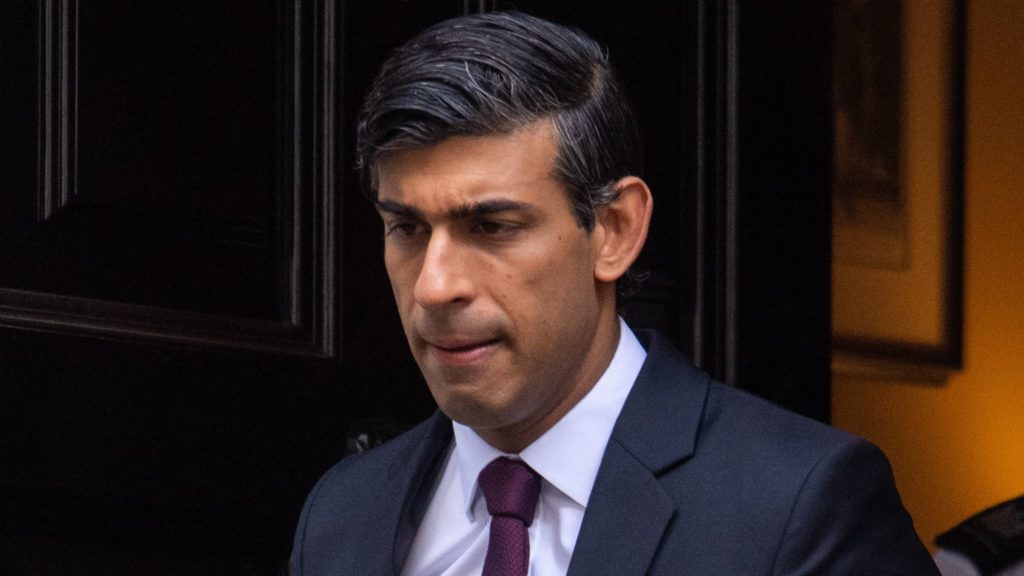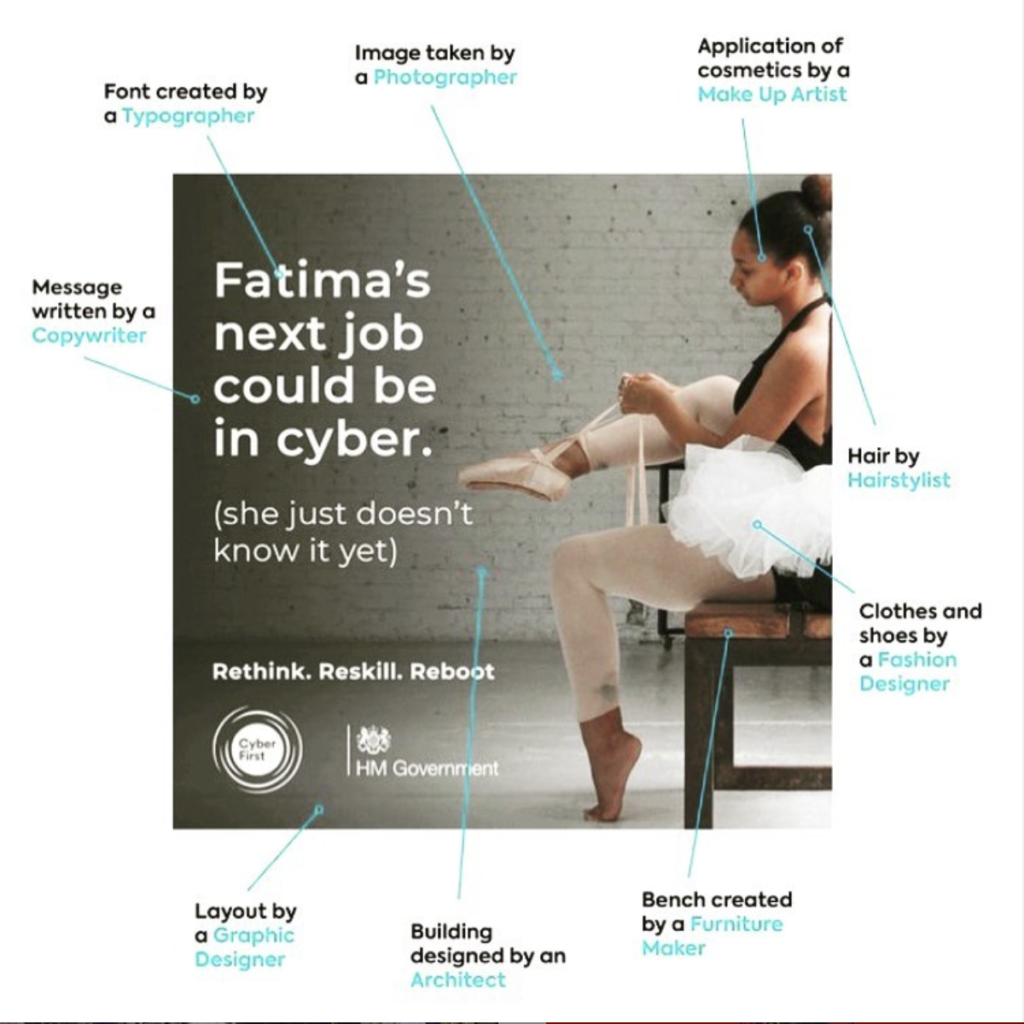The ‘Rethink, Reskill, Reboot’ series of posters – featuring Fatima, a ballet dancer – sparked outrage after it suggested she quit her job to work elsewhere. It raises two major issues; whether or not the arts industry has value, and if the government should decide what constitutes as a job or not. It should concern all workers, as it shows how quickly the government might abandon them to protect its own interests.
‘Rethink. Reskill. Reboot.’ That was the slogan for a 2019 Government-backed Cyber-First campaign. It was intended to promote cyber security jobs, suggesting that a ballet dancer called Fatima could – and should – retrain in a STEM field. It recently resurfaced this month, amid the detrimental effect that Covid-19 has had on the arts industry. #Fatima was trending on Twitter, where the poster was parodied and ridiculed by those in the arts sector. Such was the scale of the backlash, that Culture Secretary Oliver Dowden had to intervene, calling the poster ‘crass’. Earlier in October, Chancellor Rishi Sunak appeared to suggest that musicians and others who work in the arts should retrain and find other work, however he insisted that he was speaking about all workers, not just the arts sector. He said “Can things happen in exactly the way they did? No. But everyone is having to find ways to adapt and adjust to the new reality”. Whilst this may be a reasonable comment at face value, there is a underlying implication of the devaluation of the arts industry by the government, which should concern not only those in the arts sector, but future voters who will have to evaluate which political party values their profession enough for it to not be considered expendable by the government.

Photo credit: Sky News
There are two issues here. One concerns the arts industry itself, and whether or not it has value; it does, tremendously so, and the government should realise this. The other issue is the idea that the government – or any organisation of authority – is in a position to determine which jobs are valuable or not. Starting with the former, it is wrong for the government to imply or suggest that arts professionals are not as valuable as those working in other sectors. The arts sector is an extremely valuable and vital part of British society. According to Arts Council England, the arts and culture industry contributes over £10 billion a year to the economy, with over 360,000 employed in the sector, and has grown by £390 million in one year (2019). In addition to this, it is reported that this industry has overtaken agriculture in terms of contribution to the economy.
Ironically, the viral poster itself is as a result of the arts industry. Every aspect of the poster was as a result of an arts professional. The photograph of Fatima? A photographer. Her make-up? A make-up artist. Her outfit? A fashion designer. Her hair style? A hairstylist. The ‘rethink, reskill, reboot’ slogan? A copywriter. The font of the message? A typographer. Layout and design of the poster itself? A graphic designer. The government itself benefits from the arts sector, but uses the industry to discourage those who wish to pursue a career in that industry? How does this make any sense? Is the government not aware of the irony, and the bitter taste that their fraudulence leaves in the mouths of arts professionals? Does it not realise the need for the arts sector, or worse; is it arrogant enough to assume that the arts are only necessary when it benefits them?

Following this train of thought, one must take a look at the aforementioned latter issue; whether or the government has the authority to determine which jobs are valuable and which aren’t. It sets a dangerous precedent for workers in all sectors, because it sends a message that the government is more concerned about its own interests, rather than the population it’s supposed to manage and protect. There is a suggestion that the public sector is more valuable than other sectors, and that the state’s interests and affairs take precedence over other industries. Evidence of this is shown in the advert itself. It focused on Fatima, a ballet dancer, and stated that she might have to retrain in IT. This shows that the government does not consider ballet to be a career that is ‘good enough’ to work in. There is a callous, cruel and patronising tone to the message, implying that this industry isn’t worth much because the government doesn’t benefit from it.
It begs the question; if it wasn’t ballet, what other craft would the government use to demonstrate and imply its apparent inferiority? Why did the government not use another art form instead of IT to suggest a career change? Why else would the government promote IT in its poster? Would the government benefit from ballet dancing as a craft? No, it wouldn’t. It would be difficult to imagine a full-time public servant working in that craft. Would the government benefit from IT professionals? Yes, it probably would. Therefore, it would seem that in the government’s eyes, jobs become more valuable based upon whether or not they can benefit. This is extremely arrogant. What makes working for the government more valuable than the private sector or freelance work? Does the government think so highly of itself, that it feels it can create a hierarchy of ‘valuable’ jobs based upon their narrow-minded worldview?
Even so, fortunately it’s not all bad news. In July 2020, the Department for Digital, Culture, Media and Sport announced a huge one-off rescue package for the arts industry, worth £1.57 billion. Culture Secretary Oliver Dowden said, “our arts and culture are the soul of our nation. They make our country great and are the lynchpin of our world-beating and fast-growing creative industries”. Whilst this will come as great news to arts professionals, one must also consider that the government has introduced schemes to help other industries also. An example of this is the hospitality industry; VAT paid on takeaway or eat-in food and non-alcoholic drinks was reduced from 20% to 5% until January 2021, and the hugely successful ‘Eat Out to Help Out’ scheme (50% discounted food up to the value of £10 per person) helped to smooth out demand in restaurants. Arts professionals should not take the financial package at face value; they are not the only ones to benefit from the government’s schemes and therefore should not consider themselves to be any more or less valuable than any other industry.

It could be argued that the government’s approach and attitude towards the arts sector was mistimed and insensitive. There are also opposing narratives that imply an element of truth to the posters; Covid is here to stay, at least for the near future, and people WILL have to adapt to survive. Even so, it does leave a sour taste in the mouths of arts professionals, and should send a message to all workers; when extreme situations arise, the government will prioritise. Any job will be at risk, and if that means you get left behind, so be it. Your industry may not be as valuable as you think it is. The government is not your friend; loyal to nobody.


